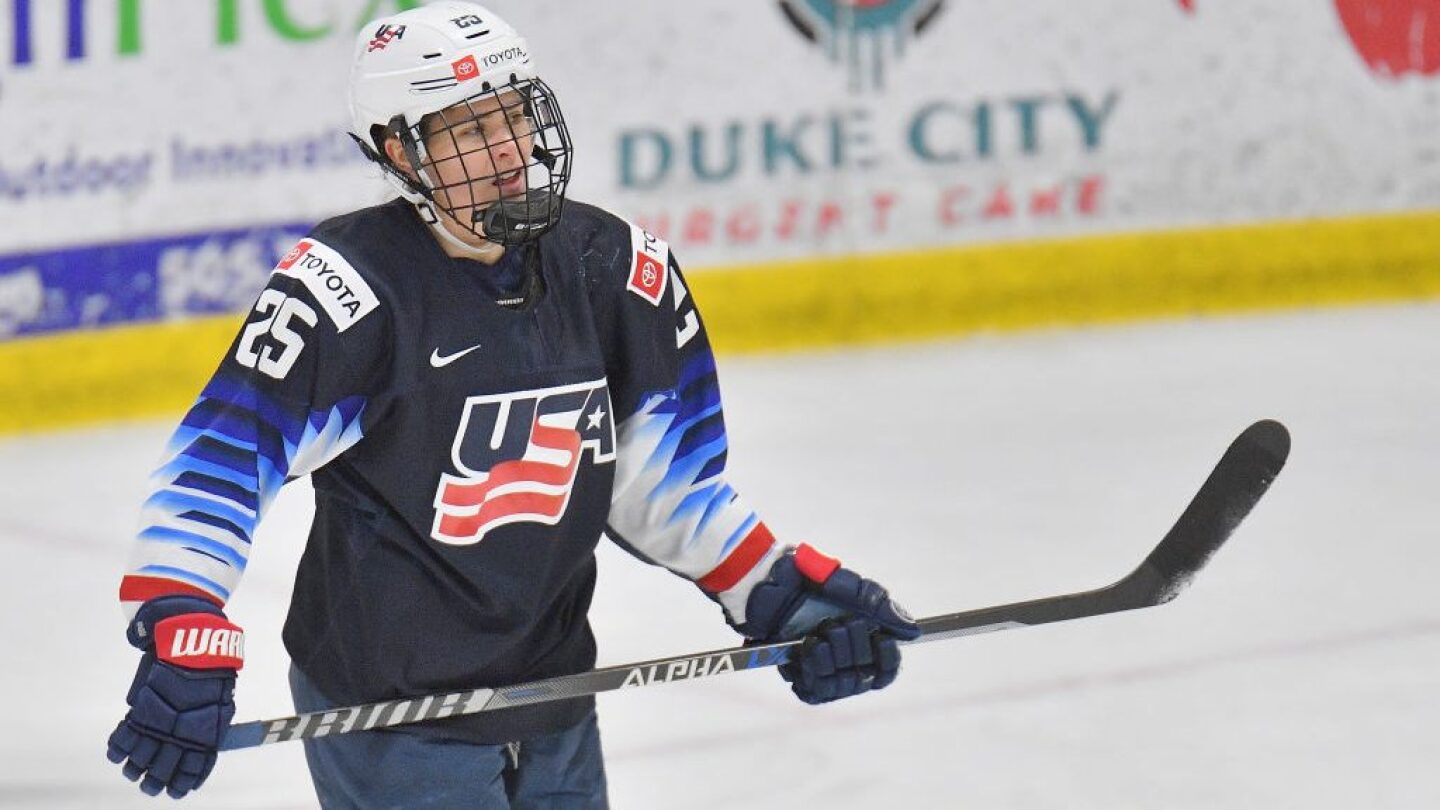On a mid-December day in a Blaine, Minnesota, lounge, USA Hockey women’s national team director Katie Million addressed the player group that was left after the final cuts.
Congratulations, this is the Olympic team.
That’s how Megan Bozek, a 30-year-old defender from Buffalo Grove, Illinois, remembered it.
Bozek immediately looked across the room at Alex Carpenter, a 27-year-old forward from North Reading, Massachusetts. Carpenter reciprocated.
“The two of us, in particular, share a certain perspective,” Carpenter said.
Bozek and Carpenter became the first U.S. women’s hockey players to make an Olympic team, get cut from the next team and come back to make the following team.
“The average person doesn’t understand what type of sacrifice and commitment that takes,” said Jocelyne Lamoureux-Davidson, who played with Bozek and Carpenter at the 2014 Olympics, where the U.S. took silver in an overtime loss to Canada. “There’s not many people who understand the journey.”
Start on May 5, 2017. USA Hockey named the women’s national team for the 2018 Olympic run-up. The roster size: 23 players, including Bozek and Carpenter. The Olympic roster size: 23 players. It appeared all of them would be going to South Korea in nine months’ time.
But, in a move reminiscent of Herb Brooks, three skaters were added to the national team in October and November: Cayla Barnes, a Boston College freshman, Haley Skarupa, a forward who played on the previous three world championship teams, and defender Sidney Morin, a pro playing in Sweden who had never suited up for the senior national team.
Suddenly, the team would have to make three cuts. First up was forward Annie Pankowski.
Then, in December 2017, Bozek sat in the lobby of the team residency and received a tap on the shoulder from an assistant coach.
“I knew right then and there that it wasn’t a good sign,” Bozek said. “It’s humiliating, embarrassing.”
Bozek said she was blindsided by the news, based on conversations she had with coaches throughout the autumn residency period.
“I had no inclination that this is the way that they were leaning,” she said. “And as that conversation then came into play, when it [getting cut] was actually happening, you’re speechless, you don’t know what to say, you have every emotion going through your body.”
The meeting ended. Bozek walked back to her apartment. Then she got a call from Carpenter, who had just gone through the same process, separately. Carpenter, like Bozek, didn’t have much to say when she got cut.
“I just wanted to get away from where we were and head home and be surrounded by my family and friends,” she said.
Lamoureux-Davidson said they were the most surprising cuts of her decade-long career with the national team.
“In our view, neither of those two should have gone home,” Lamoureux-Davidson and her twin sister, Monique Lamoureux-Morando, wrote in their book, “Dare to Make History.” The twins, veteran leaders, would have spoken up and asked questions, but their places on the team were in jeopardy that autumn, too.
Bozek flew to Toronto and joined the CWHL’s Markham Thunder mid-season. Carpenter ended up in China, joining the CWHL club Kunlun Red Star. Her dad, longtime NHL player Bobby Carpenter, coached the Kunlun men’s team that season.
Carpenter didn’t watch the 2018 Olympic women’s hockey final, which the U.S. won over Canada in a shootout for its first gold since women’s hockey’s debut in 1998. Her club had a practice at the same time.
“Happy for them,” Carpenter said of the Olympic team. “Lots of my friends that I’ve known for a long time.”
Bozek did watch the epic final, with friends in Toronto early in the morning.
“It makes me appreciate those girls [who won gold] that much more, because a lot of those girls are my best friends,” she said. “And I knew that Alex and I helped them get to the position that they were in, whether we were on that roster or not. We trained with them every single day, went to battle with them every single day. And you’re a big part of that, and it’s something that we can’t forget.”
The U.S. women’s national team coaching staff turned over after Olympics, as usual. Both Bozek and Carpenter were invited back into the program for camps and made every world championship team in this Olympic cycle.
“I can speak for myself, and I think also speak for Alex, that the heartbreak that we felt in 2018 just gave us more motivation to come back in and try to prove that we still deserve a spot on this team,” Bozek said.
Carpenter, the U.S.’ leading goal scorer at the 2014 Olympics, then scored both U.S. goals in the 2021 World Championship final, an overtime loss to Canada.
For her, having then-head coach Bob Corkum personally call her and invite her back for a training camp three years ago marked a turning point in her career.
“Seeing that I was wanted in this program,” she said.
In 2019, Bozek joined Carpenter’s club team. They played together in China, and then in Russia after the team relocated after Covid hit. Now, they’ll go back to China together, looking for the gold medal that all of their teammates brought home four years ago.
“Getting to be on this journey with her,” Bozek said, “just brings me back to all the great memories we’ve had, all the tough memories we’ve had, and that we’re making right now and about to make next month.”
OlympicTalk is on Apple News. Favorite us!







